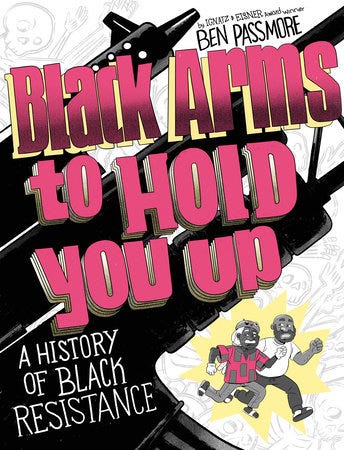Why You Should Buy My Friend’s Book: Black Arms to Hold You Up
Short post on being a researcher for a graphic novel about Black armed struggle
An incredibly talented friend of mine Ben Passmore released a book today. I had the opportunity to play a small part in it’s creation as a researcher for it. It’s a beautiful graphic novel about the history of Black armed struggle in the United States. It’s one of the best histories of many Black liberation organizations and movements that are not very well known to most people. He also re-engages with well known figures like Assata Shakur and directly references some of the best parts in her autobiography. The book also delivers one of the strongest critiques of the Black Lives Matter movement I’ve read in a while.
I’ve talked a little bit about this in my essay “Reading into Writing” but I spent most of my time in college reading Black radical literature. I wrote papers on the Republic of New Afrika, The African Blood Brotherhood, the Revolutionary Action Movement and theoretical positions such as “the Black Belt Thesis”. I was also reading about the Black Liberation Army from perspectives from people such as Assata, Sundiata Acoli, Ashanti Alston and Kuwasi Balagoon. You probably haven’t heard of most of these nouns. I didn’t think I would ever use the stuff I studied in college other than for my own personal knowledge of self. Luckily, Ben was writing this book and I ended up getting to use a lot of my knowledge about esoteric Black radical histories. It was kinda perfect as a first post-college gig. There’s lot of research that we did that never ended up in the book, either. I can’t express enough that the book was incredibly well researched. Ben is one of the few people in the country who has as knowledge equal to or probably better than mine in regard to Black radical history in the United States. While not even bringing up the merits of his art or powers as storyteller, a book with a comprehensive history such as this one has never really existed in any real way before. There’s a lot of value in it.
In an era where Black radical politics are increasingly just another way for people to market their Instagrams with little substance or real engagement with the history, Ben’s book is a triumph. The book tries to contend with some of these contradictions around Black radical politics being co-opted. Another strength of the graphic novel is how it personalizes and cracks a variety of jokes throughout the story. In the podcast episode that Maurice and I did with Ben about the graphic novel, he talks a bit about why he chose to insert humor into telling a story about these sacred histories.
Finally, one of the other strengths of the book has to do with how it grapples with the decline of the Black liberation movement from the sixties into the moment we find ourselves in now. The sobering history of Black radicalism is critical as many are willing to act as if there was some big revolution in that period while in fact the revolutionaries were mostly jailed and killed. I can’t recommend the book enough.
In other related news, I wrote a new article for The Metropolitan Review about riots in literature that arrived yesterday. The essay deals a bit with another one of Ben’s graphic novels, Sports is Hell which depicts a riot in a fictionalized Philadelphia. If you are interested in my take on riots in literature, please check it out.
Go read the book and check out the podcast if you get a chance!




this is so dope! where can we check it out?